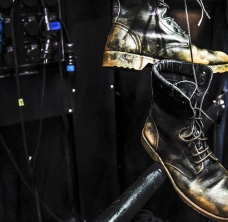Production sponsors

The Greek National Opera presents one of the most famous operas of the 20th century, Dmitri Shostakovich's Lady Macbeth of Mtsensk, on 12, 15, 17, 19 and 22 May 2019 at the Stavros Niarchos Hall of the Greek National Opera at the Stavros Niarchos Foundation Cultural Center, in a new and highly ambitious production, directed by Fanny Ardant and conducted by Vassilis Christopoulos.
Based on a novel by Nikolai Leskov, Lady Macbeth of Mtsensk treats the subject of woman's position in provincial pre-revolutionary Russia. At the same time, Shostakovich astutely satirizes institutions of his day, such as the church and the tsarist police. The story is about Katerina Izmailova, the wife of a wealthy merchant, who feels neglected and trapped in her marriage. She falls in love with one of the workers at her homestead and for his sake she ends up murdering her father-in-law and her husband. Katerina marries her beloved one, however when the murders are revealed, the couple is arrested. On the way to Siberia, Katerina gets in a fight with some new prospective mistress of her husband and they both get swept away in the freezing waters of the river.
Dmitri Shostakovich was born in 1906 in Saint Petersburg and ranks among the most influential composers of the 20th century. His relationship with the soviet regime, especially during the Stalinist period, was not an easy one, as his style was incompatible with the directives about art, and he was twice officially accused of formalism. Though influenced by Igor Stravinsky's neoclassical works, and in his symphonic music by Gustav Mahler, he did shape his own fully recognizable personal idiom. He composed all kinds of works, among which 15 symphonies, 6 concerts, 15 string quartets, choral works, music for ballet and the cinema, works for piano, song cycles and operettas. He completed two operas, The Nose (1930) and Lady Macbeth of Mtsensk (1934, second edition as Katerina Izmailova, 1962) while leaving behind drafts for many more. He died in 1975 of lung cancer.
The thrilling trajectory of the opera Lady Macbeth of Mtsensk hides one of the most dramatic pages of censorship but also of universal recognition in both the operatic and the modern European history.
The opera premiered in one of the oldest opera houses of Russia, the Mikhailovsky Theatre, then called Little (Maliy) State Opera Theater of Leningrad, on 22 January 1934, and a while later at Stanislavski's Moscow Art Theatre. The work was immediately received with enthusiasm in both cities and reported as a musical masterpiece. The clear, unequivocal references to sex and the raw violence imparted an unprecedented sense of realism to the opera. Shostakovich's musical language, direct, condensed and to the point, was also something unparalleled. Its impressive reception by the audience immediately brought it out as the most important opera of the Soviet period. A few months later, on 26 December 1935, the work was mounted at the Bolshoi Theatre in Moscow. On 26 January 1936 the performance was attended by Joseph Stalin, who left before its end. Two days later, «Pravda» newspaper, the official instrument of the Soviet Union Communist Party, published the today famous article titled «Confusion instead of music: About the opera Lady Macbeth of the Mtsensk district». The article condemned the music of the opera as «formalistic», «petit-bourgeois», «raw», «vulgar» and was unsigned - today it is considered certain that the text had been approved by Stalin. It was a terrible blow, as the full of impetus and plans Shostakovich, who had not yet turned thirty, did not complete any other opera till his death, although he did leave behind many drafts.
In the mid-50s, after Stalin's death, Shostakovich revised the score. Nevertheless, the presentation of the opera was still not allowed. The much-desired green light was given almost ten years later. The opera in its new form, titled Katerina Ismailova, was finally staged on 8 January 1963 at the Moscow Art Theatre. In this second form it toured to London, Nice, San Francisco, Brno, Milano, Zagreb, Kiev, Leipzig, Prague, Vienna, New York, Helsinki, Florence and Poznan. It continued to conquer one musical metropolis after the other across the world until 1978, when the initial version of the opera was restored, performed on stage and recorded in the West. As a result, opera houses turned to it and Lady Macbeth of Mtsensk toured the whole world anew, as one of the most influential operas of the 20th century. The opera in its initial form was presented again in Russia just in 1996! Today, the work is performed almost exclusively in its initial form, allowing audiences worldwide to enjoy its inspired, powerful and full of nerve music.
Shostakovich was, from the beginning, clear as to his intention to make the murderess protagonist of his opera appear as a victim. At the same time, in Lady Macbeth he leaves behind him the bolder music elements that characterize his preceding opera The Nose. «I tried to make opera's musical language extremely simple and expressive. Opera is first and foremost a vocal art and singers should be preoccupied with their main obligation, which is to sing, not to discuss, orate or recite», notes, among others, the composer. A large part of the opera's power comes from its great musical variety. Bluntly realistic in its action and love scenes, and during Zinoviy's murder, the music is highly poetical in its cruelty. The work doesn't stand out only for its rawness and cruelty; it is also deeply moving, and not only in its final scene, which summarizes centuries of pain and deprivation in Russia.
The GNO has commissioned the production of Shostakovich's masterpiece to Fanny Ardant, a prominent figure of the French cinema and theatre. Ardant, the star of sixty movies and thirty plays, Truffaut's muse, Zeffirelli and Polanski's protagonist, the unique «woman next door» alongside Depardieu, collaborates for the first time with the Greek National Opera, after her two musical theatre stagings at the Th??tre du Ch?telet in Paris (Messager's V?ronique in 2008 and Sondheim's Passion in 2016). Fanny Ardant, who stamps her mark on a bold production -sharp and unconventional- by turning the spotlight on issues such as individual freedom, boldness, incandescent limitations, notes: «Lady Macbeth puts a mirror in front of us. And in it, we look at ourselves. Lady Macbeth is our wild reflection, restless and free. How can the part of ourselves which fights back against the law survive in a conventional and uniform society? To love criminals is a risk. And I take it. I love Katerina Izmailova. She is not only one of Leskov's characters in an opera of Shostakovich; she is also an ever-present person even in our own time; and if we pay attention, we may meet this person. I love those who are not afraid of the verdict, the sanctions of society, the parties, the groups, the collective thinking. I watch them walking on a tightrope, fragile perhaps, but vibrating and incandescent. I dread the moment they will fall. I understand that they prefer to die than to destroy their dreams. I admit that they are a danger to the society of merchants and profits. I admire the cost they are prepared to pay in order to remain free and follow their passion. Being accountable is part of their own rules of the game. I am glad they have journeyed through life like stars in a solar system whose sun is black. I adore the story of Katerina, the Lady Macbeth of the Mtsensk district. To me she is like a picture. I received her as a gift which I would like to offer to you. I told myself: Time, politics don't matter. Context, circumstances don't matter. Laws don't matter. There will always be those who obey and those who order, the follower and the leader, the one waiting in line and the other who just leaves it, one day or another, after having waited for long for the real and violent joy, because life's calling is more powerful than anything else. And so, I keep Lady Macbeth in the district of Mtsensk, in her province, in the Tsars' empire, in her environment, the one of merchants. Shostakovich's music, even richer and with a starker contrast than the text itself, recounts to us the complexity of Katerina and her rivals, how her melancholy was overpowered by anger, blasphemy and the act that cannot be undone, how this contradictory and scandalous heroine makes us want to live, even -and for the most part- dangerously. And since the Greek shores welcomed me, may the Olympian Gods - if they deign to look at me- guide and protect me.»
Aiming at a high-level artistic output of worldwide appeal, Fanny Ardant introduces a great creative team to the Greek audience: Tobias Hoheisel in sets, Milena Canonero and Petra Reinhardt in costumes, Luca Bigazzi in lighting and (LA)HORDE collective in movement coaching.
The sets are designed by the awarded German stage designer Tobias Hoheisel. Hoheisel has stamped his mark on exceptionally successful theatrical productions, among others, at the English National Theatre, the Royal Shakespeare Company, the Almeida, the Royal Court, Schaub?hne in Berlin, the Austrian National Theatre, the Edinburg International Festival etc. At the same time, he has distinguished himself in the field of opera, by designing sets for productions for the greatest opera houses in Europe and the States, such as, among others, the English National Opera, the Royal Opera House in London, the Vienna State Opera, the Berlin State Opera, the German Opera of Berlin, the Paris Opera, the Gran Teatre del Liceu in Barcelona, La Scala in Milan, the Opera of Lyon, La Monnaie in Brussels and the Chicago Opera, the San Francisco and the New York City Operas.
The costumes are co-designed by two renowned costume-designers: the multiple Oscar winner Milena Canonero and Petra Reinhardt, famous for her collaboration with Robert Carsen.
The famous costume designer Milena Canonero has won four Oscars for the costumes in Stanley Kubrick's Barry Lyndon, Hugh Hadson's Charriots of Fire, Sophia Coppola's Maria Antoinette, and Wes Anderson's Grand Budapest Hotel, while she has also stamped her mark on the costumes of other famous movies (among which A Clockwork Orange, 2001: A Space Odyssey, Midnight express, Out of Africa etc.). Along with the cinema, where she is considered much sought-after and particularly selective in her collaborations (presently she is at the making of Wes Anderson's new film), she also designs extraordinary costumes for great opera productions in leading theatre houses and festivals, such as the Metropolitan Opera, the Paris Opera, La Scala in Milan, Salzburg Festival, the Vienna State Opera etc.
Petra Reinhardt is a distinguished German costume designer, living in Rome. Reinhardt has presented her work across Europe, America and in China. She worked at Bayrische Staatsoper in Munich, Staatsoper Wien, Semperoper Dresden, Muzijektheater Amsterdam, Bejing Opera in Bejing, Festival die due Mondi in Charleston, with directors as Klaus-Maria Brandauer, William Friedkin, Johannes Schaaf, Chen Shi-Zheng and many others. In recent years she has been very closely collaborating with the renowned opera director Robert Carsen in opera houses such as La Scala in Milan, Op?ra National Bastille in Paris, the Parisian Op?ra Comique, the Berlin's Komische Oper, the Baden-Baden Festival, La Com?die Fran?aise, Op?ra de Lausanne and Th??tre des Bouffes du Nord in Paris.
As movement coaches in the production Fanny Ardant chose the French artists Collective (LA)HORDE (Marine Brutti, Jonathan Debrouwer, Arthur Harel). La Horde was formed in 2014 in Paris and became famous for their choreographies with communities of non-professionals through the internet. They collaborate with people on the fringes of the dominant culture, without being interested in hierarchies, such as with people aged over 65, the blind, teenagers etc. According to Le Nouvel Observateur magazine, La Horde is active in the vital space between dancing, visual arts and performance, and they are inspired by spectacles, movies and books.
The lighting of the production is designed by the internationally acclaimed and multi-awarded Italian photography director, Luca Bigazzi, known from Paolo Sorrentino's multi-awarded films, and from his collaboration with Abbas Kiarostami.
The production bears the stamp of one of the most important conductors of the younger generation, Vassilis Christopoulos, who had also successfully conducted Strauss' Elektra, the opening production of the Greek National Opera at its new premises in the Stavros Niarchos Foundation Cultural Center, in October 2017. He had served as director of the Athens State Orchestra (2011/14) and leading conductor at the Southwest German Philharmonic Orchestra of Constance (2005/2015). He has conducted orchestras such as: the London Philarmonia Orchestra, Mozarteum Orchestra Salzburg, Hannover Radio Philharmonic Orchestra, Nuremberg Symphony Orchestra, New Japan Philharmonic, Flanders Symphony Orchestra, Queensland Symphony Orchestra and Orchestre national des Pays de la Loire. His operatic repertory covers a very wide range extending from baroque to the 21st century. He has recently conducted with great success Richard Strauss' works Elektra and Die Frau ohne Schatten at the Wiesbaden State Opera. In 2016 he was elected as professor of orchestra conducting at the Frankfurt Music Academy.
In the title role, the outstanding Russian soprano, with the exceptional vocal capacity and stage presence, Svetlana Sozdateleva, who has successfully interpreted Katerina Izmailova, among others, in Moscow, Oslo, Helsinki, and has appeared at leading opera houses in Brussels, Berlin, Bologna, Munich, Saint Petersburg etc. In 2020 she will make her debut at the New York Metropolitan Opera in the leading role of Prokofiev's Fiery Angel.
The role of Sergei is interpreted by the tenor Sergei Semishkur, soloist at the Mariinsky Theatre in Saint Petersburg. His repertory includes roles from the Italian opera, the entire Russian school, but also French opera and even Jan??ek's operas. He has collaborated with important directors such as Graham Vick, Dmitri Tcherniakov etc. and top conductors such as Valery Gergiev, Philippe Auguin, Placido Domingo, Gianandrea Noseda etc. He has sung at the Metropolitan Opera, the Carnegie Hall, Barbican, Salzburg, Berlin etc.
In the role of Boris, the celebrated Greek bass-baritone Yanni Yannissis, who, in parallel with his career in Greece, has appeared at the world's greatest opera houses, such as, among others the Metropolitan, La Monnaie, Scotland, Frankfurt etc.
Alongside them, younger and acclaimed Greek soloists such as: Yannis Christopoulos, Sofia Kyanidou, Dionysos Tsantinis, Giorgos Matthaiakakis, Filippos Dellatolas, Babis Velissarios, Panayiotis Priftis, Nikos Stefanou, Stamatis Beris, Vangelis Maniatis, Dimitris Kassioumis, Petros Magoulas, Victoria Mayfatova, Antonia Kalogirou. The GNO Chorus will be conducted by Agathangelos Georgakatos.









 Greek National Opera
Greek National Opera

